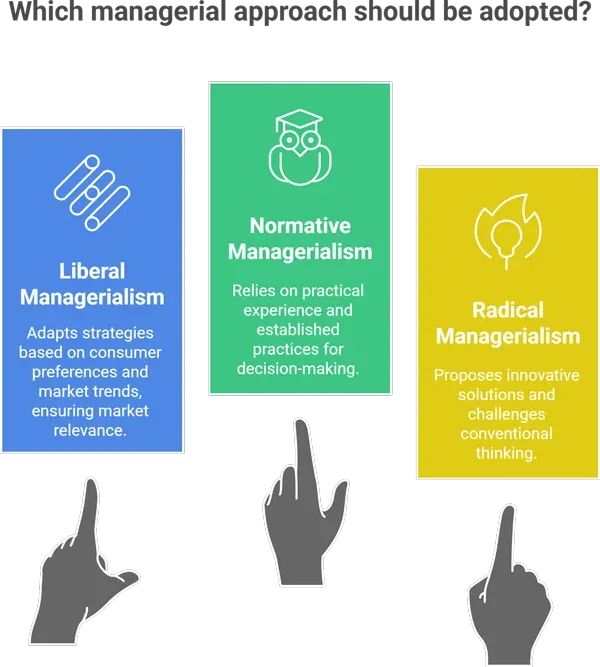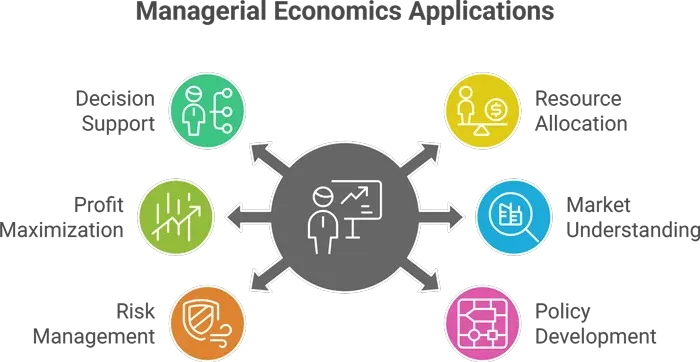Managerial Economics: A Strategic Edge for Today’s Business Leaders

In today’s fast-moving business world, success depends on understanding competitive advantage, economic forces, and using data smartly to drive strategy and boost shareholder value. In such a scenario, managerial economics works as a guiding light for organizations.
Think of managerial economics as the GPS for business strategy guiding leaders through market uncertainties, resource decisions, and competitive challenges. This blog covers everything professionals need to know to navigate with confidence.
In this blog, we’ll explore how this discipline transforms decision-making from guesswork into calculated precision, turning managers into modern-day detectives of business strategy.
What is Managerial Economics?
Managerial economics is the application of economic principles and analysis to business decision-making. It helps managers make informed choices by using data, logic, and economic tools to solve problems related to costs, pricing, production, and strategy. The goal is to improve organisational efficiency and profitability by guiding decisions that are both practical and economically sound.
Importance of Managerial Economics
Managerial economics is essential for making smart business decisions. It provides a structured approach to solving complex problems related to pricing, production, investment, and resource allocation. By applying economic principles, managers can optimize resources, reduce costs, and improve profitability.
It helps in forecasting market trends, understanding consumer behavior, and managing risks in uncertain environments. Managerial economics also supports policy-making, strategic planning, and performance evaluation ensuring decisions align with long-term business goals.
For multinational companies, it plays a key role in managing resources across borders, considering factors like exchange rates and global market conditions. Ultimately, managerial economics enhances efficiency, competitiveness, and sustainability in today’s dynamic business landscape.
Nature of Managerial Economics
Managerial economics is a practical and decision-focused branch of economics that helps managers solve real-world business problems. Its nature can be understood through the following key aspects:
- Interdisciplinary Approach: It blends concepts from economics and management, creating a powerful framework for decision-making. This integration helps managers apply economic thinking to business strategy and operations.
- Microeconomic Foundation: Managerial economics is rooted in microeconomics, focusing on individual firms, consumers, and markets. It helps managers understand pricing, production, and resource allocation to achieve business goals.
- Decision-Oriented: The core purpose is to support managerial decision-making. It provides tools and techniques to evaluate options, assess risks, and choose the best course of action aligned with organizational objectives.
- Practical and Application-Based: Rather than being purely theoretical, managerial economics is highly pragmatic. It addresses day-to-day business challenges like cost control, demand forecasting, and competitive strategy using economic principles.
- Optimization Focus: Managers use it to optimize outcomes whether that’s maximizing profit, minimizing cost, or improving efficiency. It guides the best use of limited resources to achieve desired results.
- Dynamic and Adaptive: Business environments are constantly changing due to technology, competition, and consumer behavior. Managerial economics helps managers stay agile by analyzing trends and adapting strategies accordingly.
- Prescriptive and Descriptive: It not only explains how economic forces affect business decisions (descriptive) but also suggests what actions managers should take to reach specific goals (prescriptive).
- Behavioral Insights: Modern managerial economics also considers behavioral economics, recognizing that psychological factors and biases can influence managerial decisions. This adds depth to understanding how choices are made in practice.
- Macro Context Awareness: While focused on firm-level decisions, it also considers broader economic factors like inflation, interest rates, and government policies that impact business performance.
Key Types of Managerial Economics

1. Liberal Managerialism
In a free and competitive market, customers have many choices. To stay relevant, companies must adapt their strategies based on consumer preferences and market trends. If they fail to do so, they risk losing their market position or even facing failure. This flexible, customer-driven approach is known as liberal managerialism, where decision-making is shaped by market dynamics and consumer demand.
2. Normative Managerialism
Normative managerialism focuses on making decisions based on practical experience and established business practices. Managers rely on real-world insights to guide choices related to product design, forecasting, marketing, recruitment, and supply-demand analysis. This approach emphasizes what should be done to support business growth, using proven methods and common sense.
3. Radical Managerialism
Radical managerialism involves thinking outside the box and proposing bold, innovative solutions especially when traditional methods fail. It requires managers to be visionary and creative, often prioritizing customer satisfaction and long-term value over short-term profits. This approach challenges conventional thinking and encourages transformative change in business strategy.
Principles of Managerial Economics

1. Decision Support: Managerial economics helps managers make better decisions in areas like pricing, production, investment, and resource use. By applying economic principles to real business situations, it guides choices that improve efficiency and support company goals.
2. Efficient Resource Allocation: Resources like time, money, and labor are limited. Managerial economics helps managers decide how to use these resources wisely by weighing different options and choosing the most productive and cost-effective path.
3. Profit Maximization: One of the main goals of managerial economics is to help businesses increase profits. It does this by analyzing costs, pricing strategies, and market conditions to find the best way to boost earnings.
4. Market Understanding: It provides tools to study market trends, customer behavior, competition, and demand-supply patterns. This helps managers develop smart marketing strategies and position their products effectively.
5. Managing Risk and Uncertainty: Business decisions often involve risks. Managerial economics helps managers assess potential risks and make informed choices even when outcomes are uncertain, using techniques like forecasting and scenario analysis.
6. Policy Development: It supports the creation of business policies by showing the economic impact of different decisions. Whether it’s pricing, expansion, or investment, managerial economics helps shape strategies that align with long-term goals.
Scope of Managerial Economics
Managerial economics is a dynamic and evolving field that combines economic theory with business practice. Its practical and analytical nature makes it a valuable tool for understanding market behavior and guiding businesses in a constantly changing environment. Below are the key areas that define its scope:
1. Demand Analysis and Forecasting
Understanding demand is key to smart business decisions. Managerial economics helps analyze what drives customer choices like price and income and predicts future demand. This enables businesses to plan better, reduce risks, and stay ahead in a changing market.
2. Cost and Production Analysis
Controlling costs is key to boosting profits. Managerial economics helps businesses analyze cost patterns, optimize input use, and adapt quickly to price changes ensuring efficient production and smart decision-making.
3. Pricing Decisions, Policies, and Practices
Pricing directly affects revenue and competitiveness. Managerial economics equips businesses with tools to set strategic prices by analyzing costs, market demand, and competition especially vital in markets with limited players.
4. Capital Management
Capital is the backbone of business growth. Managerial economics helps plan and control capital use, ensuring funds are invested where returns are highest. It guides smart project selection and efficient financial planning.
5. Profit Management
Profit reflects business success. Managerial economics helps maximize it by guiding smart decisions in pricing, cost control, resource use, and investment using tools like break-even and cost-volume-profit analysis for strategic planning.
Conclusion
Managerial Economics equips decision-makers with the analytical tools to navigate complex market dynamics, optimize resource allocation, and drive strategic growth. By understanding concepts like demand and supply, market power, comparative advantage, elasticity, and competition, managers can make informed choices that align with both short-term goals and long-term vision.
A General Management Program offers a structured approach to mastering these principles, integrating real-world applications with foundational theory. Through modules such as Managerial Economics, participants gain clarity on how economic forces shape business outcomes and how to leverage them effectively. This knowledge is essential for leaders aiming to enhance profitability, efficiency, and competitive advantage in today’s dynamic global marketplace.
Ready to elevate your decision-making skills?
Apply now to transform your leadership potential with cutting-edge executive education!
Frequently Asked Questions
Q1. What is managerial economics and how does it differ from traditional economics?
Managerial economics applies economic principles to business decision-making. Unlike traditional economics, it focuses on practical problem-solving within organisations, helping managers optimise resource allocation and strategic planning in real-world business scenarios.
Q2. How does managerial economics help in pricing strategies?
Managerial economics aids in pricing strategies through concepts like elasticity, which measures how sensitive demand is to price changes. This helps businesses determine optimal pricing points to maximise revenue and understand market sensitivity to their pricing decisions.
Q3. What role does game theory play in managerial economics?
Game theory in managerial economics helps businesses understand and predict competitor behaviour in strategic interactions. It provides frameworks for developing effective competitive strategies, particularly in areas such as pricing decisions, market entry, and negotiations.
Q4. How can managerial economics improve decision-making in uncertain business environments?
Managerial economics offers tools like scenario analysis, decision trees, and sensitivity analysis to assess risks systematically. These techniques help managers evaluate potential outcomes under different economic scenarios, enabling more informed decision-making and effective risk management strategies.
Q5. What career opportunities are available for those with expertise in managerial economics?
Expertise in managerial economics opens up various career paths, including roles such as business analyst, management consultant, and corporate strategist. These positions leverage the analytical skills and economic understanding central to managerial economics to improve organisational operations and develop long-term business strategies.

TalentSprint
TalentSprint is a leading deep-tech education company. It partners with esteemed academic institutions and global corporations to offer advanced learning programs in deep-tech, management, and emerging technologies. Known for its high-impact programs co-created with think tanks and experts, TalentSprint blends academic expertise with practical industry experience.



